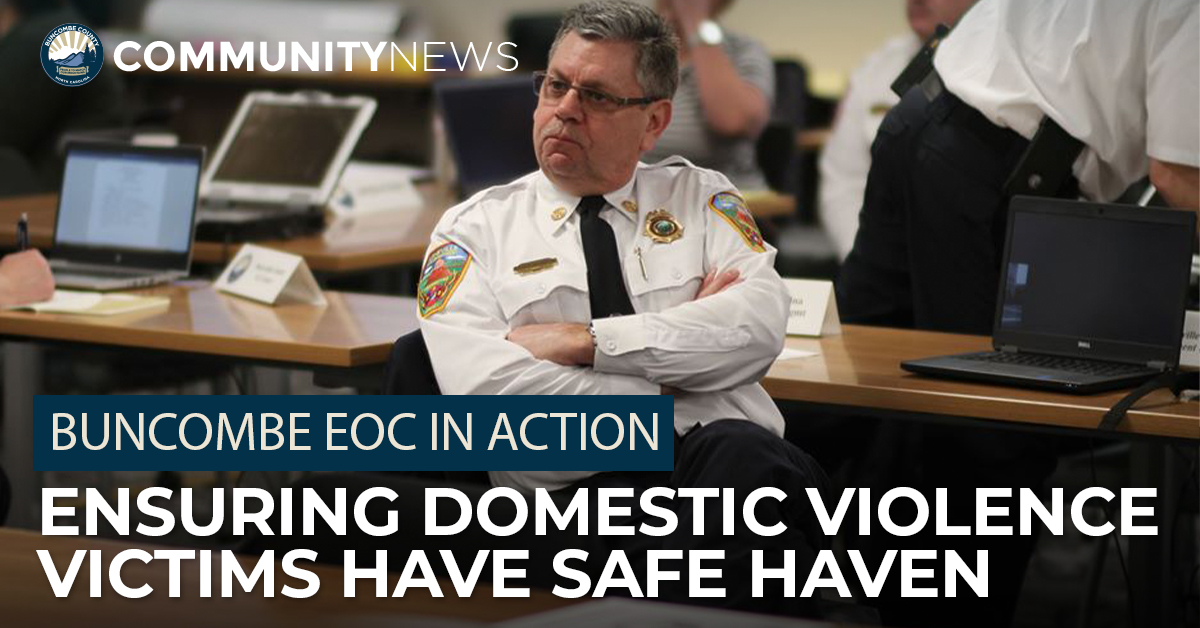This news item expired on Saturday, May 1, 2021 so the information below could be outdated or incorrect.

This is the fifth article in a series where we look at the diverse methods our EOC is using to meet real needs related to the COVID-19 pandemic. You can find the previous installments below.
Since news of the COVID-19 outbreak, Buncombe County officials have taken guidance from experts in the medical and scientific communities and treated this as a public health crisis. On March 12, Buncombe County proactively declared a state of emergency and put weeks’ worth of logistical planning into action by opening its emergency operations center (EOC). Since then, a collaboration of governments, nonprofits, school systems, and other stakeholders have been diligently and innovatively looking at ways to address myriad community needs stemming from COVID-19.
Below are some of the resources our EOC has developed and ways you can learn more about those programs.
Ensuring Domestic Violence Victims Have Safe Haven
While the best practice of staying home while we work together to stop the spread of COVID-19 is sensible for most people, there are some home situations that are dangerous. Further, toxic environments can be compounded by the demands and stress of dealing with a global pandemic, and spending extended time in isolation with someone prone to violence is a situation nobody should be forced to endure. To that end, the Buncombe County EOC, Family Justice Center (FJC), and Helpmate acted quickly to identify how to provide shelter and other essentials for victims of domestic violence that are not safe staying home.
Family Justice Coordinator Diana Sierra says Helpmate stepped up to provide overflow housing for any domestic violence victims seeking shelter. “With the County supporting with lodging costs, computer equipment for virtual supportive services, and coordination of meal donations; Helpmate is able to provide its programmatic oversight and services for domestic violence victims in the auxiliary shelter,” explains Sierra. “Helpmate will lead the process for screening, assessment of danger level, immediate needs, provision of case management, and counseling services for individuals in shelter.”
Sierra notes the increased likelihood of domestic violence during the COVID-19 pandemic is well-documented and presents specific challenges such as heightened family stress and time spent with batterers; difficulty accessing and having the privacy to reach out for help; and children being more exposed to violence as they spend more time at home. “During the first two weeks of the local COVID-19 impact, Helpmate experienced a 15% increase for overall service requests, with shelter requests rising by 225% and hotline calls up 55%,” she says. “COVID-19 has resulted in several operational hurdles… such as the inability to bring in new residents into Helpmate’s shelter while also maintaining appropriate physical distancing.” However, the confidential auxiliary location is helping with the increased demand and need for additional room due to social distancing.
If you or someone you know needs help related to escaping a domestic violence situation, please contact Helpmate’s 24-hour crisis hotline at (828) 254-0516. Also, Buncombe County’s FJC remains open Monday-Friday from 8 a.m.-5 p.m. Walk-ins are welcome during business hours and you can also call (828) 250-6900 to schedule an appointment or click here for more information.
Previous EOC in Action articles